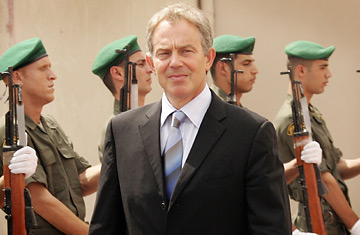
British Prime Minister Tony Blair walks past a Palestinian guard of honor in Ramallah, West Bank September 2006
Once, long ago in Russia, a Baron decided to expel all the Jewish peasants from his estate. The peasants pleaded with the Baron, but he sat there bored, petting his favorite wolfhound. After a few minutes, he waved them away. Just as they were leaving, a rabbi who had noticed how fond the Baron was of his wolfhound, said: "You know, we're very talented at making dogs speak." Intrigued, the Baron allowed the Jews to stay on for a year, to teach his dog how to talk. Outside the Baron's castle, the Jews wailed: "Rabbi, how can you make such a promise? We're doomed!" The Rabbi replied with a shrug, "Anything can happen in a year. The dog could die. Or the Baron could die. Who can tell?"
This shortsightedness applies today to the Israelis, says the diplomat. "There is no policy. The idea is to hold on as long as possible against Palestinian demands," he says. Meanwhile, the Palestinians, especially the extremists among them, cling to the dream of winning back all the land up to the Mediterranean shores, even if, in their hearts, they know it's impossible. The moral of this story: As Middle East envoy, Blair will find Israeli and Palestinian leaders who are sadly lacking in vision and pragmatism. Everyone is waiting for the Baron's dog to die.
The job comes with no Jerusalem office, and Blair would most likely find digs inside the stately American Colony Hotel, whose gardens and Orientalist splendor could seduce him into thinking that he is indeed Jerusalem's new Pasha. But Blair may find himself pacing his Ottoman-era suite with nowhere to go: the Israelis will dodge him because he will demand concessions for the Palestinians, while Palestinian President Mahmoud Abbas will lie low because he is incapable of forcing the territories' militant groups to cease their violence against Israelis, or even among themselves.
From the Palestinians' point of view, Blair has several strikes against him. For starters, he's nicknamed "Tony Bush", for his perceived closeness to the Texan in the White House. For many Arabs, Blair is tainted for having signed on, with unseemly eagerness, to the Bush Administration's misadventure in Iraq. He's also blamed for keeping silent, as the U.S. did for nearly a month, while war raged in Lebanon last summer, in the misguided hope that Israel might crush the Iranian-backed militants of Hizballah. Blair's great skill as a negotiator is that he can coax enemies into the same room and mesmerize every individual that he's in total agreement with them. That's how he brought peace in Northern Ireland, a major triumph of his decade as British prime minister. But Blair is a master of the broad stroke, and much of his job will require the talents of a miniaturist, delving into the minutiae of where Israeli checkpoints can be removed inside the Palestinian territories.
His mission is also shrinking. Formally, he will be the special representative of the Quartet of peacemakers, made up of the European Union, the United Nations, Russia and the U.S. But the Quartet's so-called "roadmap" for peace, based on a two-state solution, is now wastepaper. The Israelis are wary of outside mediators, which could leave Blair reduced to lecturing the Palestinians on good governance instead of negotiating with the two sides. This is made all the more difficult by the Quartet's refusal to engage with Islamic militants Hamas, democratically elected to power in January 2006 and now, through force of arms, the new landlords of Gaza. Will Blair have the chutzpah to speak with Hamas to reconcile their split with Abbas? And will the Israelis let him?
Hamas certainly doesn't think so. Salah Bardaweel, head of Hamas' parliamentary bloc, says he doubts that Blair will be able to "disconnect himself from America and its pro-Israeli policy." That doubt was shared by one senior Arab official at the recent Sharm al-Sheikh summit who said that Blair's appointment is seen around the Middle East as a favor bestowed by the White House in recognition of his loyalty as an ally.
In Blair's favor, however, are his megawatt charm and drive. Who else would leap at the chance to do diplomacy's most thankless job? It also helps that, so far, he has the trust of Bush and the Israelis. "We have nothing but respect for him," said Tzipi Livni, Israel's foreign minister.
But that respect could fade if the Israelis think that Blair is pushing them too far. Blair should take note of what befell his predecessor, James Wolfensohn, an American former president of the World Bank. Wolfensohn started out with everything going for him, but when he complained about some of Israel's more onerous policies inside the territories, and about the Quartet's decision to cut off aid to the Palestinians after Hamas' election victory, the White House shunned his advice as too pro-Palestinian and left him dangling. Eventually, he quit. If Blair starts to challenge Washington's pro-Israeli tilt — which Arab officials say is crucial to unknotting the Israeli-Palestinian impasse — he could end up similarly sidelined. Blair may find that getting the Baron's dog to speak could be an easier task than getting the Israelis and the Palestinians to speak meaningfully to each other.
